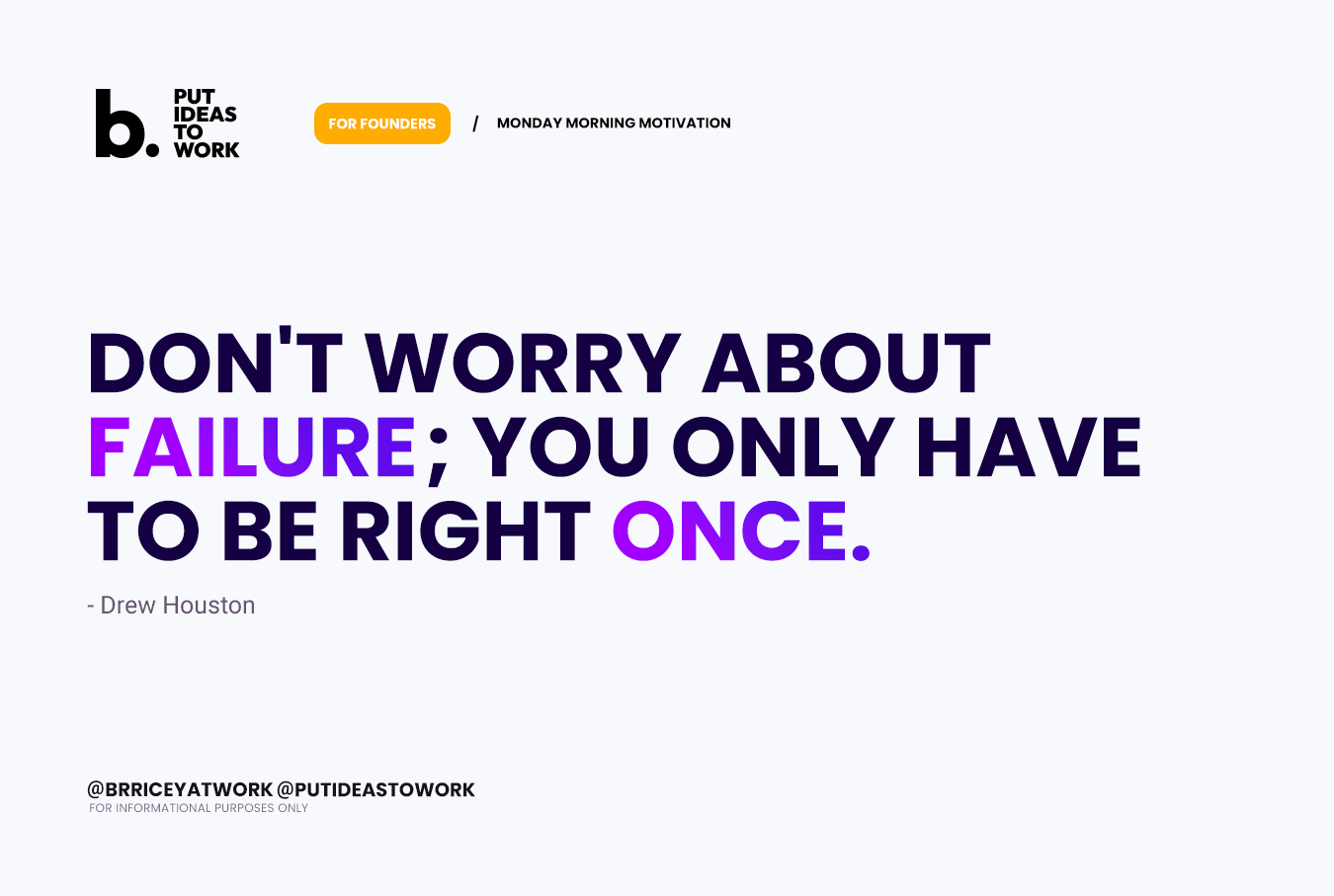Monday Morning Motivation: You only need to be right once.
"Don't worry about failure; you only have to be right once." – Drew Houston, Co-founder of Dropbox.
If you are building a startup or a new venture within a corporation, you have probably been told that failure is part of the process. But let's be honest - knowing that does not make rejections, pivots, or financial struggles feel any less brutal.
The sleepless nights.
The rejections from investors.
The pivots feel like starting over.
The overwhelming question: "Am I wasting my time?"
But (most likely) every founder who has succeeded in their mission has been where you may be today.
The difference? They did not stop.
You will never have everything right the first time when building something new from scratch.
You need to get just one big thing right. And that one big thing maybe something unexpected and never planned for. Potentially directly from your friends, your customers, or potential investors, not necessarily directly from your head.
Stay in the game.
Some may think that a founder's success comes from a series of perfect decisions, but history tells us a different story.
Airbnb was rejected by many investors.
Slack started as a gaming company. They spent years building a game but noticed their internal messaging tool was useful. That "failure" turned into a billion-dollar business.
WhatsApp was just another messaging app. But they focused relentlessly on simplicity, privacy, and zero ads. That single insight made them indispensable, leading to one of the most significant acquisitions in tech history.
While luck is a factor, you can’t always control it. Yet, these ventures, teams, and founders showed unwavering determination. Through continuous learning, iteration, and adaptation, they discovered a game-changing move.
And that's the game you're playing. Not perfection. Not overnight success. But the constant search for that one move.
Why failure is just data in disguise?
Let’s reframe failure.
Failure is not a dead end—it is market feedback.
Every misstep is actually giving you invaluable information:
Customers not paying at your pricing point? Now you know what does not work.
Did your MVP flop? Now you know what is missing.
Investors passed? Now you know where your pitch needs improvement.
Every “failure” is a step forward if you’re paying attention.
The best founders, leaders and teams aren’t avoiding failure—they’re using it as a learning tool.
That pivot, that one move that changes everything.
Many desired unicorns and successful ventures often no longer look like their original idea.
Instagram started as Burbn, a location-based check-in app. However, users only cared about the photo-sharing feature. So, the founders scrapped everything else.
PayPal originally built encryption software before pivoting into digital payments. If they had never pivoted from their initial intent, the early success of online auctioning and shopping may have looked very different.
Your first idea is rarely your best idea, but like wine can get better over time.
What matters is whether you're listening, iterating, and willing to adapt when the proper insight appears.
The Founder Mindset Shift: Play the Long Game
If you are struggling at work and thinking about quitting, take a deep breath, pause and reflect. Here’s how to shift your mindset:
Done is better than perfect. Stop overthinking and get something into the hands of real users. The best insights come from the market, not from your own head.
Failure is an experiment, not an ending. Every setback is a data point. Ask yourself: What did I learn? What should I try next?
Flexibility is your greatest asset. If users love one unexpected feature—double down on it. If investors give consistent feedback,—adjust your pitch.
Small wins compound. You do not need to build a billion-dollar company overnight. Just land one great customer, one key investor, one small validation. That’s how you build momentum and gain traction.
Keep pushing. Keep iterating. Keep believing.
In startups and new ventures, you do not always need to be right; sometimes, you need to be right once. It could be the next thing you try.
Interesting Content Found:
Airbnb's Early Rejections: In 2008, Airbnb co-founders Brian Chesky and Joe Gebbia sought to raise $150,000 at a $1.5 million valuation, offering a 10% stake in their company. They approached seven investors, five of whom sent rejection emails, while two did not respond.
https://medium.com/%40bchesky/7-rejections-7d894cbaa084Slack's Pivot from a Failed Gaming Company: Slack originated as an internal communication tool used within Stewart Butterfield's company, Tiny Speck, during its work on the development of "Glitch," an online video game. After realizing the game's lack of profitability, Butterfield decided to repurpose the communication tools into what became Slack.
https://techcrunch.com/2019/05/30/the-slack-origin-story/WhatsApp's founders, Jan Koum and Brian Acton, emphasised simplicity and user privacy as core principles. They deliberately avoided advertisements and prioritised a straightforward, user-friendly interface, which contributed to the app's widespread adoption and eventual acquisition by Facebook.
https://www.wired.com/story/whats-app-owner-founder-jan-koum-facebook/
https://www.fastcompany.com/40459142/whatsapps-cofounder-on-how-it-reached-1-3-billion-users-without-losing-its-focus




